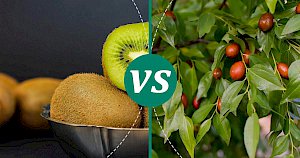Jujube vs Kiwi: Health Insights
Where is more calories, protein, carbs - what is more healthy?


Kiwi vs Jujube fruits: Nutrition Comparison
| per 100g | Jujube | Kiwi |
|---|---|---|
| Calories | 79 | 61 |
| Carbohydrates | 20.53 g | 14.66 g |
| Fat | 0.2 g | 0.52 g |
| Protein | 1.2 g | 1 g |
| Calcium | 21 mg | 34 mg |
| Iron | 0.48 mg | 0.31 mg |
| Magnessium | 10 mg | 17 mg |
| Potassium | 250 mg | 312 mg |
| Sodium | 3 mg | 3 mg |
| Zink | 0.05 mg | 0.14 mg |
| Vitaminium B1 (Thiamine) | 0.02 mg | 0.027 mg |
| Vitaminium B2 (riboflavin) | 0.04 mg | 0.025 mg |
| Vitaminium B3 (Niacin) | 0.9 mg | 0.341 mg |
| Vitaminium C | 69 mg | 92.7 mg |
More Calories in Jujube fruits
At first glance, you can see that in jujube fruits is more calories than in kiwi.
Jujube fruits has 79 kcal per 100g and kiwi 61 kcal per 100g so it is pretty easy to calculate that the difference is about 30%.
In jujube fruits and in kiwi most calories came from carbs.
See tables below to compare jujube fruits with kiwi in details.
Jujube fruits And Kiwi Nutrition Difference
- Calories:
jujube fruits - 30% more than kiwi - Carbohydrates:
jujube fruits - 40% more than kiwi - Fat:
kiwi - 160% more than jujube fruits - Protein:
jujube fruits - 20% more than kiwi
More protein in jujube fruits
It is aslo easy to see see that in jujube fruits is more protein than in kiwi.
There is 1g per 100g of kiwi and 1.2g per 100g of jujube fruits so using simple math we can see that difference is about 20%.
More carbohydrates in jujube fruits
In jujube fruits is more carbohydrates than in kiwi.
There is 14.66g/100g of carbohydrates in kiwi and 20.53g/100g in jujube fruits so let me do the math for you again - difference is about 40%.
Less fat in jujube fruits
In jujube fruits is less fats than in kiwi.
The tables above show us that there is 0.52g/100g of fats in kiwi and 0.2g/100g in jujube fruits. In this case difference is about 160%.
Jujube
79kcal- Calories79
- Carbohydrates20.53 g
- Fat0.2 g
- Protein1.2 g
100g | ounce | handfull | cup | half cup
Calories source
- 93% CARBS.
- 5% PROTEIN
- 2% FAT
Kiwi
61kcal- Calories61
- Carbohydrates14.66 g
- Fat0.52 g
- Protein1 g
100g | ounce | single piece | slice | cup | sliced
Calories source
- 87% CARBS
- 6% PROTEIN
- 7% FAT
Vitamins: kiwi vs jujube fruits
- Vitaminium B1 (Thiamine):
kiwi - 35% more than jujube fruits - Vitaminium B2 (riboflavin):
jujube fruits - 60% more than kiwi - Vitaminium B3 (Niacin):
jujube fruits - 164% more than kiwi - Vitaminium C:
kiwi - 34% more than jujube fruits
Minerals: jujube fruits vs kiwi
- Calcium:
kiwi - 62% more than jujube fruits - Iron:
jujube fruits - 55% more than kiwi - Magnessium:
kiwi - 70% more than jujube fruits - Potassium:
kiwi - 25% more than jujube fruits - Sodium:
kiwi - 0% more than jujube fruits - Zink:
kiwi - 180% more than jujube fruits
Compares of jujube fruits
- Jujube Fruits vs Apple
- Jujube Fruits vs Banana
- Jujube Fruits vs Blueberries
- Jujube Fruits vs Cranberries
- Jujube Fruits vs Fig
- Jujube Fruits vs Grape
- see all compares of jujube fruits
Compares of kiwi
Read also:
- Calories from Jujube
- Calories of Kiwi
- Calories in Kumquats
- Lemon calories per 100g
- Loquat carbs per 100g
- Lychee protein per 100g
- Mango fat per 100g
- How many calories does mangosteen have?
- Calories in a half of nectarine
- Calories in whole nectarine
- Calories for one, two or more nectarines
- How much protein in orange?
Marcin Piotrowicz
calories-info.com creator
Healthy diet and healthy lifestyle promoter
Add comment